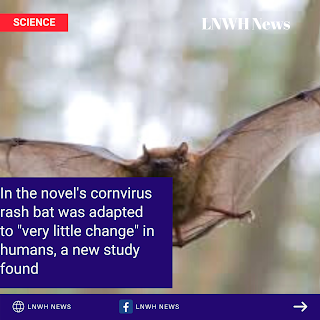A new study found that ,cornvirus rash bat was adapted to "very little change" in humans, virus ability to spred every person probably devolpoed in mammals
 |
| cornvirus rash bat was adapted to "very little change" in humans,The study, published in the journal PLoS Biology, evaluated several thousand hierarchical genomes of the SARC-COVI-2 rna virus |
In the novel's cornvirus rash bat was adapted to "very little change" in humans, a new study found that the virus's ability to spread from one person to another was probably developed in flying mammals. Which is a new human host.
The study, published in the journal PLoS Biology, evaluated several thousand hierarchical genomes of the SARC-COVI-2 rna virus and found that there was very little "significant genetic change" for the first 11 months of the COVID-19 epidemic.
It turned out that the change as a D614G conversion and tweets similar to the virus spike protein had an impact on its biology.
"This does not mean that no changes have taken place, no evolutionary significant mutations have accumulated and" surf "millions of infections, as they all do with viruses," explained Oscar McLean, the first author of a study at Glasgow Center University.
But scientists said it was surprising that the SARC-COVI-2 came from the beginning
"Usually it takes time for adaptation to be able to spread viruses affecting new host species, such as SARS-CoV-2, and at most it can never be at that stage, resulting in a dead-end spillover or localized outbreak."
Sergei Pond, another co-author of the study from Temple University in the US, said.
Analyzing the coronavirus and related overall covarius-managed mutations - the covid virus group belongs to bats and pangolins - scientists have found evidence of significant changes, but the emergence of SARS-CoV-2 in all humans. .
Based on these observations, the researchers said that stork-covid-2 brought a strong ability to infect humans and other mammals, a trait that probably developed in bats before they became infected in humans.
"While an undisclosed '' convenience '' of intermediate species cannot be discounted, collectively, our results support the ability of the RNA predecessor of the SARC-COVI-2 to be capable of efficient human-human transmission as a result of evolutionary history adapted to bats, not viruses." Created, ”the scientists wrote in the study.
Although the novel coronavirus still clears up the human immune response to the vast majority of infections, scientists warn that it is advancing much faster than all current vaccines in January 2020 to boost immune immunity.
Current vaccines will continue to work against most prevalent alternatives, but the longer the time elapses and the greater the difference between vaccinated and unvaccinated people, they say, there will be a greater chance of getting rid of the covid rash vaccine.
"The first competition was to create a vaccine. Now the race is to vaccinate people around the world as quickly as possible," said David L. Robertson, lead author of the study at the University of Glasgow.
Post a Comment
Don't allow spam link